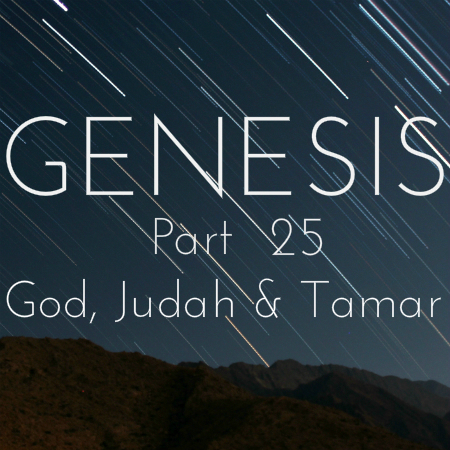24 About three months later Judah was told, “Tamar your daughter-in-law has been immoral. Moreover, she is pregnant by immorality.” And Judah said, “Bring her out, and let her be burned.” 25 As she was being brought out, she sent word to her father-in-law, “By the man to whom these belong, I am pregnant.” And she said, “Please identify whose these are, the signet and the cord and the staff.” 26 Then Judah identified them and said, “She is more righteous than I, since I did not give her to my son Shelah.” And he did not know her again.
27 When the time of her labor came, there were twins in her womb. 28 And when she was in labor, one put out a hand, and the midwife took and tied a scarlet thread on his hand, saying, “This one came out first.” 29 But as he drew back his hand, behold, his brother came out. And she said, “What a breach you have made for yourself!” Therefore his name was called Perez. 30 Afterward his brother came out with the scarlet thread on his hand, and his name was called Zerah. –Gen. 38:24-30
Along with chapters 19, 29, and 30, Genesis 38 is one of the more uncomfortable sections to read in all of Scripture. The graphic language and explicit sexual content make it a passage that is frequently neglected in terms of in-depth study either in small group studies or times of gathered worship. This is unfortunate for many reasons. Firstly, this is an example of how the Bible reflects the messy realities of life in a fallen world. Secondly, the events of the chapter serve once again to demonstrate that the plans and purposes of God will not be thwarted, even in the midst of collective sin and failure of His people to worship and obey Him.
Genesis 30 focuses on Jacob’s son Judah and his daughter-in-law, Tamar. The narrative serves the wider purpose of creating a pause in the Joseph narrative, allowing time for the events to occur that we will read about in subsequent chapters of Genesis. This chapter also serves to further draw a contrast between Joseph and the rest of the sons of Jacob (Judah, in particular). Though the chapter reveals the flaws in Judah’s character, it also sets him apart from the other brothers, preparing him for an ever increasing position of leadership among the brothers that will culminate in Genesis 49 and the blessing he receives from Jacob.
Genesis 38 begins by describing Judah’s marriage to a Canaanite woman and listing the children that she bore to him. The account then introduces Judah’s daughter-in-law, Tamar, who is given in marriage to his oldest son, Er (38:6). This man is described as wicked in the sight of the Lord and the passage informs us that the Lord put him to death for this wickedness. Tamar was then given to Judah’s second son Onan in order that he might fulfill the levirate custom and have a son with her on his brother’s behalf. He also committed evil in the sight of the Lord and was put to death,leaving Tamar without a husband or a son who could carry on the name of her first husband and guarantee security for her into her old age. According to custom Judah would now have to offer his third son to her, but instead he declared him too young to marry and sent her back to the home of her father.
In the time that followed, Judah’s wife passed away, and after going through the customary period of mourning, he decided to take part in the yearly shearing of the sheep, a festive occasion in the Ancient Near East. Word came to Tamar that Judah would be coming through her town. She disguised herself as a cult prostitute and placed herself where she would encounter her father-in-law. After negotiating with her, Judah agreed to leave her with his signet and staff. Judah returned home following their encounter while Tamar found herself to be pregnant by him. In the course of time Judah received word of Tamar’s pregnancy and, furious with anger, demanded that she be burned to death for engaging in sexual immorality. When she was brought before him, she showed him the signet and staff, declaring that their owner was the father of her child. Realizing the gravity of the situation, Judah admitted that he had been unrighteous in dealing with his daughter-in-law, and though her actions are not condoned, the Lord blesses both her and Judah with two sons, Perez and Zerah.
In Revelation 5:5, Jesus is referred to as the ‘Lion of the tribe of Judah.’ What are we then to make of the sordid details of the life of the head of the tribe from which the Messiah Himself would come? The events of this chapter demonstrate that God does not remain separate from the brokenness of His people but, instead, comes to them in order that He might redeem them. Judah’s two sons died because of their wickedness, but Jesus, the son of Judah according to his humanity, died because of His righteousness and in the place of the sinners from which He himself was descended according to the flesh. Judah’s own failures and limitations as well as those of the Davidic kings who would descend from him would point continually for the need of a new head of the tribe who would lead in righteousness, securing God’s blessing for both his kinsmen as well as the rest of mankind.
Join us this Sunday as we worship the Lion of the Tribe of Judah together and recall His person and work as we celebrate communion.
Soli Deo Gloria.
-Thomas

